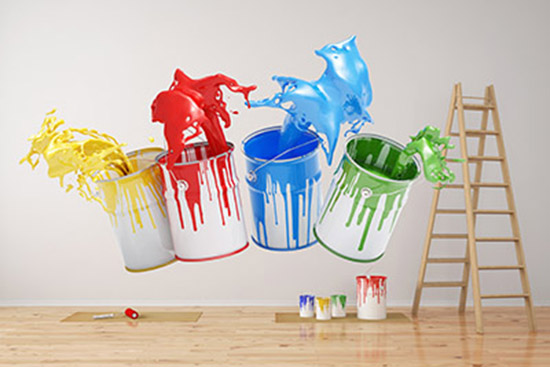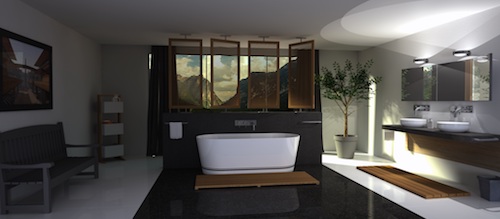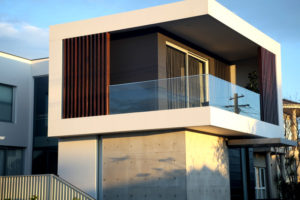
24, Jun, 2018 | Commercial Painting Tips, Home Painting Tips, Industrial Painting Tips
Painting can be quite technical and there are many things that can go wrong. In this blog, we will cover a few of potential issues that can affect your paint job. Utilising a professional painting company like Painting Pros can prevent painting problems.
Efflorescence
Efflorescence (means to “to flower out” in French) is a technical painting term referring to the white mineral deposit found on concrete or masonry surfaces, particularly brick. It occurs when salts migrate to the surface of a porous material and forms a coating
Efflorescence (which means “to flower out” in French) is the migration of a salt to the surface of a porous material, where it forms a coating
Trained, experienced painters such as Painting Pros recognise situations where efflorescence may occur and can use a number of techniques to reduce the possibility. For example treating the surface to ensure it is clean, dry and does not have any traces of mould or algae. In addition, alkali-resistant sealer and specific topcoats can be used.
Typically, efflorescence occurs during initial construction. Therefore, curing the surface (waiting for approximately 30 days prior to painting (or 10 weeks in the case of fibrous or set plaster)
Surfactant leaching
Surfactant leaching is when blotchy, oily, or sometimes glossy, marks appear on painted surfaces, usually within the first few weeks of painting. The marks can vary in colour from clear, white, orange, tan or brownish in colour.
This phenomenon can occur with either external or interior painting and occurs when drying conditions are sub-optimal
Utilising experienced, trained painters, such as Painting Pros, can ensure issues like these do not occur.
Drying and Hardening of Water-Based Paints
Water-based paints go a two-phased drying process:
Phase 1: Evaporation
Phase 2: Coalescence
The final hardening of the paint is dependent on the final coalescence leaving the paint film which can take up to two weeks under optimal conditions (temperature of 20-25 degrees and humidity less than 50%). Longer under sub-optimal conditions. Precautions should be taken prior to complete drying, such as avoiding moisture, humidity, rain, cleaning of surfaces and resting objects on freshly painted surfaces.
Therefore despite the paint surface looking and feeling dry, the paint may not have hardened. Therefore experts such as Painting Pros can advise the best way to treat your newly painted surfaces.
Chalking – as defined in AS/NZS 2310:2002 – Glossary of paint and painting terms, is “The appearance of a loosely adherent fine powder on the surface of a paint film, arising from the degradation of one or more of its constituents”.
Chalking is due to the paint coating breaking down due to UV light. Some chalking is inevitable. However, the use of specific paints and techniques can reduce the time taken and the amount of chalking.
Painting Pros use specific products such as The Dulux® Weathershield® which guarantees premature blistering, flaking and peeling of the coating system.
Stay tuned for part two when we will investigate some more potential painting problems.

12, Feb, 2018 | Home Painting Tips, Commercial Painting Tips, Industrial Painting Tips
Painting your property can have significant benefits. See our blog on benefits of painting your home’s exterior and benefits of painting your home’s interior. Choosing the right painting company can maximise these benefits. However, conversely the wrong painting company may mean that you are not gaining the benefits you might otherwise achieve. Many of our customers have asked our advice on how to choose the right painting company. So we decided to write this blog.
Meet your painting company representative prior to the job
Meeting your painter enables you to check on a few things before choosing the right painting company. Things you may want to note are their timeliness, knowledge of paints, surfaces and similar jobs. You have the opportunity to ask them questions face to face so that you are able to judge the way they respond. Below are some questions to may want to consider.
Questions to ask when choosing the right painting company
- Do they offer a guarantee?
- Do they have the proper qualifications/Are they licenced? Note: (You can check painting company’s licence status (including any insurance claims) on the NSW Service website:
- Are they insured?
- What type of paints do they use?
- Low VOC paints? (low Volatile organic compounds)
- Light-resistant paint?
- Fade-resistant paint?
- Non-slip coatings for commercial/children/elderly
- Do they have a tried and proven methodology?
- How long have they been in business?
- Do they prepare surfaces properly?
- How will our work/home be disrupted during painting?
We look forward to answering all these questions for you. We have published most of the answers on our Painting Services page. However, we look forward to discussing them with you in as much detail as you need.
Reviewing the Quote
Find out what is included in the quote. You should expect the following: scope of work, sequence and timing of paint to be completed, specification of preparation, the number of coats, products included i.e. types of primer, paints etc, cost and payment schedule, and the workmanship guarantees.
As tempting as it may seem to accept the cheapest quote, it may not be the cheapest in the long term. If the quote seems very low and too good to be true, it is probably is. It may seem that you are saving money. However, in the long term you may end up with cost over-runs and re-painting. Reputable professional painters have the right tools, paints and products to ensure a long-lasting, quality result. Therefore, they may not be the cheapest quotation.
Make sure you read the contract carefully before signing and ensure the contract contains a payment schedule and timings as well as any special conditions you agreed up front.
Pay it forward
When you are happy with your painting job, pay it forward. Help the next client by posting a great review on Google or on your painter’s website.
You may be surprised to find out how hard it is to garner reviews, even when your clients love your work! We would love to get your Google review here or individual review on our website

14, Dec, 2017 | Commercial Painting Tips, Home Painting Tips, Industrial Painting Tips
Should I paint my home?
Many people ask themselves: “Should I paint my home or should I hire professional painters?”. We are often asked: “Why hire professional painters?”
You may think that painting is easy. However, it takes real skill to achieve a great result, especially if it is important to get the job done quickly. If you hire professional painters, they should be licensed, trained and qualified to do the best job for you.
The purpose of this blog is to understand the benefits of professionals when choosing between DIY or Professional Painters.
Time
Our most frequently asked question is “how quickly can we get this done”. Most people want the paint job completed quickly. If you DIY it usually takes a great deal longer. The experience and expertise that professional painters’ possess means they can complete the job more quickly and get a better result. A reputable professional painter will give you a timeframe and stick to it
Result
The results that you achieve from a reputable professional painter is outstanding. Which is not surprising since its their business. Their experience, expertise and training means that they know what they’re doing and they have tricks of trade to get the job done more efficiently and with better results. They understand that detailed preparation leads to an outstanding finish and know the right tools and paints to use for each surface
Details
Professional painters pay attention to the details because they know that if they compromise on the details it will show in the end result.
Insured
Professional painters have a licence which means they have insurance. Therefore, if anything is damaged, they can cover it through their insurance. You can have the peace of mind that is something goes wrong with the job, you are covered. There are conditions, so make sure you discuss this with your painter prior to commencement
Preparation
Preparation can be very time-consuming. Professional painters know how to prepare to ensure a quality finish. A reputable painter knows that proper preparation leads to excellent results. If you were to DIY, you may not know how to do so or what tools to use to prepare. If you do know, it maybe a costly, time-consuming and physically laborious and taxing process to prepare properly.
Tools
A good paint job requires more than paint and a paintbrush. Depending on the job, it may require safety tools. If you were to purchase the high-quality tools that a professional painter uses, it would be very costly.
Expertise
A professional painter knows the right paint to use on each surface to ensure the right finish and durability
Ideas
A professional painter has vast painting experience and can offer ideas and suggestions you may not have thought of.
Safety
There are hazards to painting. Professional painters are trained in safety measures and won’t take risks when it comes to your home or your safety. If something goes wrong, they are insured. However, a DIY painter is subject to risks.
We hope that we have helped you answer the question: “Should I hire a painter or do it myself?”
Painting Pros specialise in painting. They know the tricks of the trade and have the know-how to achieve a great result in the shortest timeframe. Painting Pros pride themselves on getting the job done on time with minimal disruption to you and with an outstanding finish. So go ahead, fill out an enquiry form today.

5, Sep, 2017 | Commercial Painting Tips, Home Painting Tips, Industrial Painting Tips
We thought we would do some research to find out what is generally recommended before giving our opinion. The answer can vary greatly from 2 to 15 years and depends on a number of factors, as you have probably already guessed.
In this blog, we will answer this question based on what it is you want to paint and where it is located. Our focus, for the purposes of this blog, will be on residential houses and apartments. In which case, the question should consider external or interior surfaces. We will cover both.
Firstly, we will cover the interior. We need to consider factors such as the amount of moisture in a room. Clearly, bathrooms and laundries will be exposed to more moisture and will need to be painted and maintained more frequently.
How often should you paint a bathroom?

Due to humidity that is often prevalent in a bathroom, we recommend painting every 3-5 years. Good ventilation will let some of the humidity escape and extend the time between painting as will mould-resistant paint. Painting Pros are experts in the application of mould resistant paint. Ask us about it
How often should you paint a bedroom?

The main factor here is children and the number of occupants in the home. Normally internal walls need repainting every 5-10 years. However, if you have young children consider painting every 2-5 years.
How often should you paint the exterior?

it really depends on your location, the climate and the paint that you have previously used
as a guide:
- Paint on weatherboard or fibro can last up to 15 years
- Paint on timber will last up to 10 years
- Paint on render walls varies dramatically based on the painter. If applied professionally, paint can last up to 10 years. However, much less if not applied properly. This is where professionals like Painting Pros really make a difference.
- Stained and/or clear finished timber needs to be redone every 2-5 years.
Environmental considerations:
- Full sunlight will reduce the longevity by half
- If you live near the water, especially the ocean, consider repainting every 2-3. Ask us about the use of high-quality marine grade paints and maintenance to reduce salt build up in these circumstances.
- Sprinkler systems in your area
Ultimately it comes down to choosing the right paints for the situation and preparing the surfaces thoroughly. Painting Pros can advise you on the right paint for each surface and environmental condition and have a detailed preparation process to ensure the best result and longevity of your home.
Contact us to discuss







